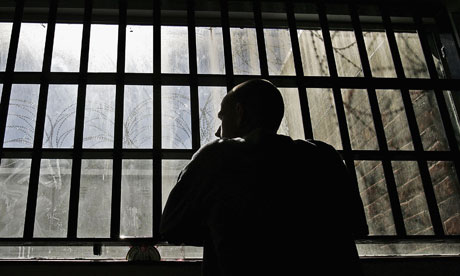The battle between Parliament and the judges has only just begun
The conflict over human rights will test our constitution to breaking point, writes Mary Riddell. 
By Mary Riddell 7:23PM BST 30 May 2011
Jeremy Bentham, who denounced the French Declaration of the Rights of Man as "nonsense on stilts", might struggle to do justice to judgments of the English courts. Injunctions to protect footballers' privacy have exposed the law to ridicule, and human rights legislation is, in its critics' view, so ill-conceived as to make the Dangerous Dogs Act look like Magna Carta.
In the most recent supposed travesty, Wayne Bishop, 33, from Nottingham, has been freed from prison early after the Appeal Court decided that serving his full eight-month burglary sentence would damage the well-being of his five young children, for whom he is the sole carer during the week.
This verdict, based on Article 8 of the Human Rights Act (HRA), which guarantees respect for family life, has evoked the fury of those arguing that protections devised after the Second World War against oppression and slaughter have become a nonsense. Truly, in the words of Mr Bumble in Oliver Twist, the law is "a ass – a idiot".
Although the HRA played no part in Sharon Shoesmith's appeal, the Mr Bumbles also detect the ugly shadow of "rights" hanging over the verdict on Haringey's former children's services director, whose sacking was ruled to have violated the fundamental principle, enshrined in English law, of a fair hearing.
The widely accepted scoreline in the latest cases is Barmy Judges 2, Common Sense nil. That is a misreading. I do not seek to defend Bishop, a lawbreaker who failed his family. Even so, children whose parents are jailed are three times more likely to become delinquent than their peers and twice as prone to mental illness.
Almost two thirds of boys with a parent in jail go on to become offenders, according to the charity Barnardo's. Do these children, overlooked by nine in 10 local authorities, have no champion? Might citizens be better and more cheaply served by attempts to break a vicious circle than by unquestioningly locking up a parent for a relatively minor offence (Bishop, however unpleasant or inadequate, was involved in stealing chocolate from a rugby club)? Do politicians who laud the right sort of family really believe that children from the wrong sort should always pay so dearly for a parent's crime?
The judges assessed some, or all, of those questions, made their ruling and thus ensured that they would be pilloried as blancmange-brained old dupes applying a tainted law. Ed Balls, the former education secretary, phrased his dissent over the Sharon Shoesmith verdict a bit more decorously, declaring that he "strongly disagreed" with the legal opinion of a trio of judges, including the Master of the Rolls.
Forget the obnoxious crowing by Ms Shoesmith or the appalling failures of the Baby P case, for which she bears much blame. The court, in deciding that Mr Balls, who sacked her at a televised press conference, flouted proper procedures and that Haringey followed suit, was merely interpreting the law as laid down by Parliament.
The rage unleashed by the verdict in the Shoesmith case is illustrative of the mounting hostility between the judiciary and Parliament. Judges and politicians do not, and should not, always agree. The danger is that their differences, for which the catalyst is usually though not invariably human rights, become a power battle leading to constitutional meltdown. That zero-sum game has begun.
The fight is not merely arm-wrestling between two different limbs of the constitution. The third player is the Strasbourg-based European Court of Human Rights, with a jurisdiction stretching from Reykjavik to Vladivostock and encompassing the 47 member states of the Council of Europe.
Tensions between these three have already brought Britain to what some regard as the brink of constitutional crisis. In fact, the stand-off has barely started. Coming over the horizon are three issues that may test the current settlement to breaking point. The first is prisoner voting. In February, Parliament decided, by a majority of 212, to defy a 2005 ruling by the Strasbourg court to outlaw a blanket ban. With the appeal process exhausted, Britain now has no legal option but to offer some prisoners the vote, as is the common European practice.
Meanwhile, two other judgments are expected from the Grand Chamber of the European Court of Human Rights. The first, Al Khawaja v UK, deals with a doctor convicted in 2005 of indecent assault, largely on the witness statement of a patient who committed suicide before the trial began. The court ruled the trial unfair because of the use, permitted under the Criminal Justice Act 2003, of hearsay evidence. Although our Supreme Court has urged a rethink, Eric Metcalfe, of the campaigning group Justice, thinks Strasbourg is likely to stand firm, thus unleashing the wrath of British judges.
The second, incendiary case, Othman v UK, concerns the radical cleric Abu Qatada, suspected of al-Qaeda links and arguably Britain's most hated man. The Government wants to deport him to Jordan, but it looks more than likely that Strasbourg will refuse, on the grounds that he would face torture. If so, the ensuing furore will make footballers' injunctions seem as minor as a fixed-penalty notice.
If our unwritten constitution is going to withstand the coming upheavals, Britain must decide its stance on human rights. To that end, David Cameron has set up a commission on whether the HRA can be replaced with a British Bill of Rights. The answer, unlikely to be speedy, is probably not. Next week, Sadiq Khan, the shadow justice secretary, will set out Labour's position in a speech entitled A Fair Trial for the Human Rights Act. Mr Khan is likely to argue that, instead of letting lazy caricatures prevail, government should stress that human rights legislation has outlawed modern slavery, stopped rape victims being cross-examined by their alleged molesters and shielded the individual from the excesses of the state.
As he has rightly said before, the HRA "stands tall as [a] proud accomplishment" of the Labour government. Those who wish – fancifully – to withdraw from the European Convention on Human Rights, or to scrap the British law, risk frustrating the urgent changes that are required. The over-burdened Strasbourg court does need reform. In some areas, such as freedom of expression, the Supreme Court should be at liberty to assert the primacy of English law. The HRA privacy clause, the result of a parliamentary fudge, should be reworked.
There will be no prospect of progress, and every chance of disaster, unless judges pick their fights with care (no more easy injunctions for rich adulterers), politicians stop abusing their role (no more treating the Commons chamber like the parliamentary wing of Twitter) and society abandons an insular view of human rights under which unpopular minorities, prisoners included, are the legitimate prey of the lynch mob.
As Ratko Mladic, the butcher of Srebrenica, is shuffled towards the dock, it pays to recall the blood sacrifice, the genocide and the torture that ensue when the rule of law collapses and human rights are scorned. Fulminating politicians, murmuring judges, greedy lawyers and outraged citizens should all remember the necessary compromises of a nation purporting to be just and fair and free.



























